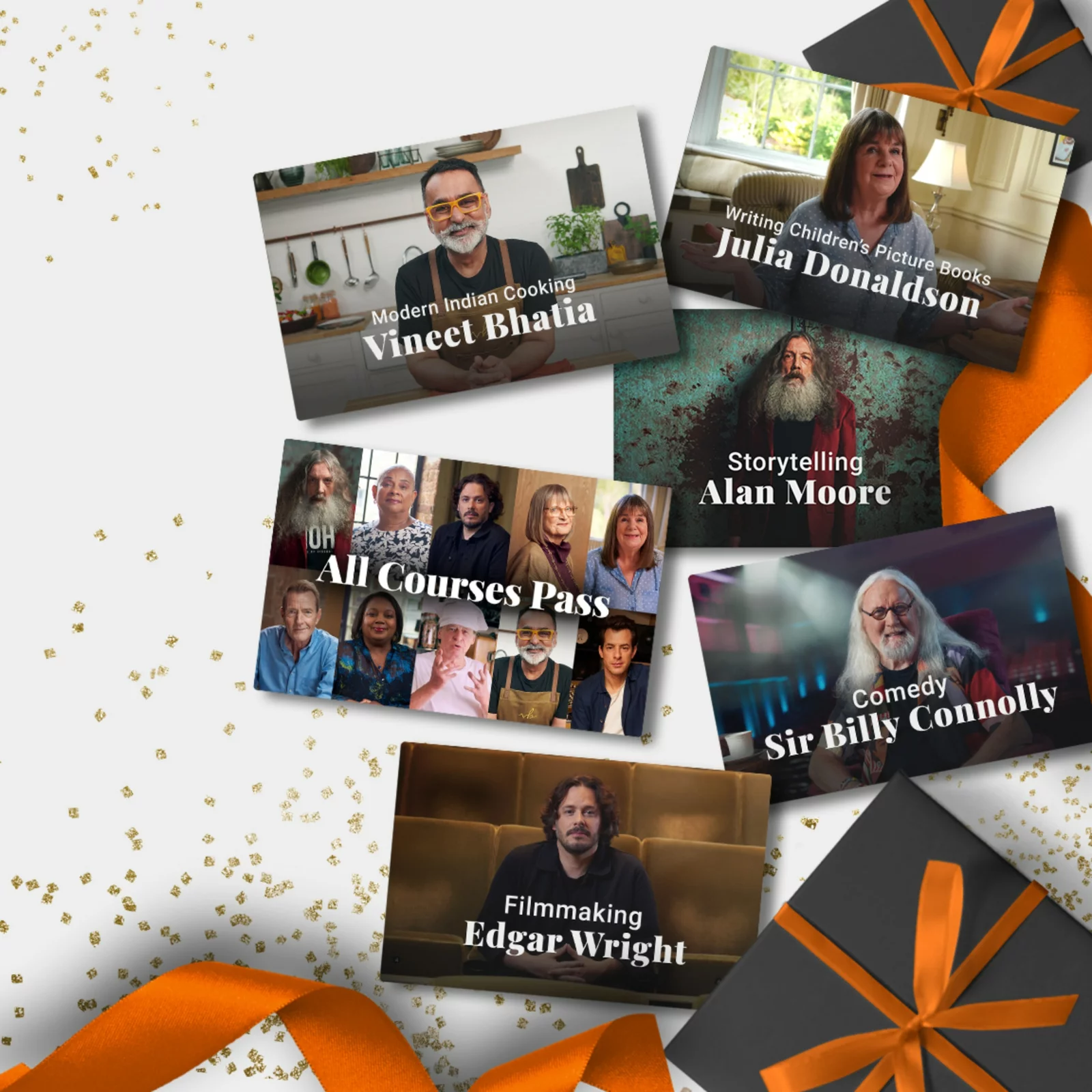
23 creative writing prompts
By BBC Maestro
If you’re an aspiring writer, you might know that it’s sometimes difficult to think of something to write about.
Whether you’re already writing a novel and are struggling to write a particular scene, or you want to write a short story but don’t know where to start, creative writing prompts are a great tool to have in your back pocket.
Here are some of our favourites to get you started.
What are creative writing prompts?
Creative writing prompts are anything that gets you writing and your creative juices flowing. They could be an invitation to write about a particular topic, a sentence to get you started, a question, or even a visual. They could draw on aspects of your real life, get you to write about something from someone else's point of view, or ask you to write something entirely fictional.
Why use writing prompts?
Writing prompts are designed to kickstart your imagination by giving you something to write about. This saves you from staring into space while you try to come up with story ideas. You might generate writing ideas that you’ll take forward, discover a new character you want to write about, or even just write a really strong sentence that you know you need to incorporate into your next story.
Writing prompts can be a great way to explore new topics. Sometimes, we’re all guilty of writing about what we know, but writing prompts can force us to think about subjects we’ve never broached before.
It can be hard to get started sometimes when it comes to writing, but prompts give you a specific starting point. That can make it easier to pick up the pen and start writing and often, you’ll find that once you’ve overcome that first hurdle, the ideas start to flow and you move onto different topics.
In that sense, writing prompts can be considered a warm-up. You wouldn't get on the football pitch and start playing a 90-minute match without warming up first, nor would you attempt a 200-metre sprint without dynamically stretching your muscles beforehand.
Creative writing prompts, then, are like your warm-up. They help you flex your writing muscles and stimulate your brain, so you might want to sit down and tackle a writing prompt before working on a new poem or novel chapter.
Writing prompts can be used as part of a free writing exercise, which is when you allow yourself to write for a set period – say two minutes – without any editing. That means no worrying about form, grammar, structure or even topic. You just write and see what comes out, which can be a good way of gathering your thoughts or generating ideas. To get started with free writing, some people like to follow a prompt to help remove any blocks that might be holding them back.

How to make the most of creative writing prompts
Whatever type of creative writing you do, it’s worth giving prompts a go to come up with new ideas, release your writer’s block, and get into the flow. But don’t worry about following the prompts too closely. They’re not meant to be prescriptive – rather, you should use them as inspiration for your own writing. If a prompt asks you to write about a mistake you made, but it sparks an idea for a poem or a story about travel instead, then just write whatever you want and let your imagination guide you.
Here are some other tips to get the most out of creative writing prompts:
- Don’t overthink it – just start writing anything; it doesn’t matter if it’s not directly related to the writing prompt. The important thing is that you get something down on paper.
- If the prompt doesn’t resonate with you, you don't need to force it. Feel free to move on to another one and see if it’s a better fit.
- Don’t feel under pressure to write anything complete – you don't need to write a full short story, poem, or novel chapter as a result of your writing prompt. It’s simply the starting point, and you're free to abandon it halfway through or take it in a different direction.
Let's dive into some fiction writing prompts for you to try next time you're stuck for story ideas.

23 creative writing prompts
1. Write your life story in five sentences, writing it in the first person. Then try writing it in the third person.
2. Write about your favourite holiday. What did you do, where did you go, who were you with, and why was it so special?
3. Look through today’s newspaper until you find a story that speaks to you.
Use it as your starting point for your creative writing practice. This is a technique Malorie Blackman likes to use. In her BBC Maestro course on Writing For Young Adults, she explains “Pig-Heart Boy was inspired by a newspaper article stating that we’d have to use animal organs for transplant because there is such a shortage of human donors. I thought that was a wonderful idea for a story.”
4. Open the dictionary and choose a word on whatever page you open. Use that as your jumping-off point, and write about whatever springs to mind.
5. Write from the perspective of an inanimate object. Choose any object, like a tree, saucepan, or backpack.
6. Sketch out a character, and answer key questions about them like:
- What is their name?
- What’s their occupation?
- What’s their background?
- Where did they grow up?
- What motivates them?
You can use our character bio template to help you develop your character further.
7. Write about your biggest heartbreak. Did you learn any lessons from it? How did it affect you?
8. Time travel exists. Write about where you’d go. Will you travel to the future or the past? What do you see, smell, eat and do? Is there anything that surprises you?
9. Write a story that begins with a character having a strange gut feeling they can’t explain. If you love the idea of writing a thriller, this is a great one to get you into the right mindset.
10. Write a scene inspired by your favourite film. It could be a deleted scene from the movie, or it could be a story about the main characters with events that aren’t featured in the film.
11. Go for a walk and take a notebook. Write down what you see around you. As Alan Moore says in his BBC Maestro course on Storytelling, “If you look at any place deeply enough, I am convinced it will have a spectacular story to tell you." So go for a walk and see if anything around you sparks a story, as "wherever you live, there is something sacred and fascinating about that ground on which you are standing. It is your duty as a writer to excavate the meaning from that ground and convey it to your readers.”
12. You get a letter that will change your life forever. Write that letter – or write about what it will change.
13. Write a story set in an airport. Who is there, where are they going and why?
14. Write about a time you were treated unfairly. When writing the character of Jack Reacher, Lee Child drew on his own experiences to create a relatable character who was seeking revenge. As he says in his BBC Maestro course on Writing Popular Fiction, “I was feeling a desire for revenge. The question was, how do I fictionalise that in an interesting way? Reacher was thrown out in the same way I had been thrown out, and like me, he was learning how to live on the outside.” Taking inspiration from Reacher, write about how being rejected made you feel and how you dealt with it. Then write about what you’d do if there were no real-world consequences.
15. Your character's child comes home from school with a detention slip. But your character isn't angry. Write about what happened and why they're not bothered that their child got into trouble at school.
16. Visit a charity shop and pick out one item that inspires you. Write about it, thinking about what it is, where it came from, what it’s used for and who might have owned it previously.
17. Write a story, scene or poem set during an apocalypse.
18. Go to a café and write about the people at the table next to you. Jot down notes about their body language, their clothing, what they’re doing, and even snippets of their conversation. Be nosy, as Malorie Blackman says: “Pay attention to people's conversations, what they say and also how they say it – accents, body language, level of gesticulation.”
19. What’s cooking? Write a story or scene about someone cooking something. What dish are they making, who are they cooking for, and what significance does it hold? What does it smell and taste like?
20. Costume party. Write a scene or story in which a character is wearing a costume. Why are they wearing it? What is the costume? And what happens while they’re in disguise?
21. Write about someone fulfilling another character’s dying wish.
22. Write something from a child’s point of view.
23. Describe a normal object from the perspective of an alien. Take a normal, everyday object and write about it from the point of view of someone who’s seeing it for the first time and finds it very strange.
Creative writing prompts are one of the best ways to incorporate writing practice into your daily routine. Give them a go and see what you come up with. And if you want to find out more about the art of writing fiction, take a look at some of our writing courses from Lee Child, Alan Moore and Malorie Blackman.
See more courses
-
Harlan Coben
Writing Thrillers -
Bill Lawrence
Writing Comedy for Television -
Ken Follett
Writing Bestselling Fiction -
Carol Ann Duffy
Writing Poetry -
Lee Child
Writing Popular Fiction -
Alan Moore
Storytelling -
Julia Donaldson
Writing Children's Picture Books -
Jed Mercurio
Writing Drama For Television -
Malorie Blackman
Writing For Young Adults -
Jojo Moyes
Writing Love Stories
-
Harlan Coben
Writing Thrillers -
Bill Lawrence
Writing Comedy for Television -
Ken Follett
Writing Bestselling Fiction -
Carol Ann Duffy
Writing Poetry -
Lee Child
Writing Popular Fiction -
Alan Moore
Storytelling -
Julia Donaldson
Writing Children's Picture Books -
Jed Mercurio
Writing Drama For Television -
Malorie Blackman
Writing For Young Adults -
Jojo Moyes
Writing Love Stories

Give the gift of knowledge
Surprise a special someone with a year's access to BBC Maestro or gift them a single course.